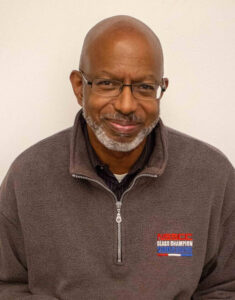But it’s not easy to get people with opposing views into the same room.
By Johannes Werner
Original Air Date: December 11, 2024
Host: Having conversations across the aisle about hot-button political issues was never easy. But today it’s a major challenge. So it was not too surprising that some of the loudest local proponents of mass deportations and wall-building were absent at an event on Monday in Sarasota that was designed to channel controversial discussion of immigration policy. We talked to the co-founder of “Conversations Across the Aisle”.
Johannes Werner: Bill Woodson is all about inclusion. So after a corporate career, and after heading the diversity and inclusion programs at a couple of universities – including at New College of Florida – the Sarasota native returned to his home town upon retirement to start a program called “Conversations Across the Aisle”, otherwise known as CATA.
This Monday, CATA held its fourth conversation, and it was about immigration.
Several dozen by-invitation-only participants gathered over dinner at the Academy at Glengary in Sarasota.
Michael Vastine, a high-profile immigration attorney in Florida and Stetson School of Law professor, started with a presentation about the history and current state of U.S. immigration law. Moderators at each of eight tables steered discussions around pointed questions.
But no controversy emerged. Everyone in the room seemed to agree that immigrants are a net contributor to the U.S. economy, outweighing the cost they may produce for public entities. Everyone seemed to agree that the human rights of undocumented migrants and asylum seekers should be a priority.
Bill Woodson says previous events had more actual representation of, well, both sides of the aisle. That was particularly the case with an event about the role of public education.

Bill Woodson
Bill Woodson: People had some strong feelings about some of the questions that we presented, and we had tough questions, challenging questions. Who should be the final arbiter of what books should or shouldn’t be on the bookshelf at the school library? Should vouchers be given so that people can take their public funds and use it to send their child to private school? Is there an issue in terms of whether accurate history is being taught in our schools, including the history of enslavement and the history of Jim Crow and the Black Codes and some of the darker aspects of our history? Is it important to teach those things to our students or not? And who should decide?
And I think what we found is that when we got past the soundbites and the headlines and really talked about the underlying issues and concerns, people were surprised to find that there was less division, less antagonism, and a lot of alignment.
JW: How will he go about making sure there are differing opinions in the room?
BW: We’re really actively looking for, how do we get more conservative voices into the room? How would you go about this? One of the things that we’re looking at is, we have people in our organization who have been a part of our protest meetings, who have connections to the Longboat Key Republican Club. In fact, we had a member of the LBK Republicans be a featured speaker in one of our gatherings. And we think we did have a bit more representation in the room of conservative voices for that particular discussion that was actually a discussion of the war in Ukraine.
We know that there’s a large constituency of conservative thought that’s building among the academic faculty at New College of Florida. We’re looking at maybe asking them to partner with us, to not only select the topic, but perhaps to be the featured speaker, or to help us with developing questions and promote that event, in a way that would hopefully catch more conservative thought. One of the topics, for example, that we’re looking at for a future meeting is, when the war on woke is won, what will we win, and what will we have lost?
JW: CATA is here to stay. Next on Bill Woodson’s to-do list is forming a nonprofit and setting up a website. While CATA has already received financial support from the Barancik Foundation and the Boxser Diversity Initiative, Woodson wants to aim for bigger grants now. Asked how difficult or prone Sarasota is to foster dialogue, Woodson, who is African American and grew up in Sarasota, said this:
BW: Even though we’re far less segregated than we were in the 50s when I was born, we’re still pretty segregated. And people still have, I think, not a very sophisticated understanding of each other. And I think that could also be an advantage, if worked correctly. A topic that’s come up that perhaps we could have a future dialogue around is the case for reparations.
JW: Johannes Werner, reporting for WSLR News.
WSLR News aims to keep the local community informed with our 1/2 hour local news show, quarterly newspaper and social media feeds. The local news broadcast airs on Wednesdays and Fridays at 6pm.